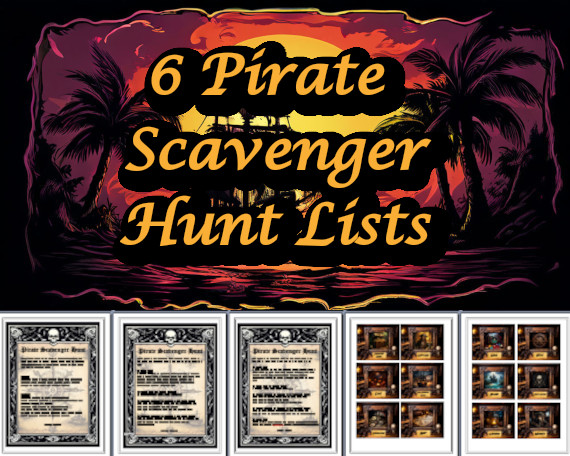
Treasure Hunts for Preteens and Middle Schoolers
Planning any type
of activity or event for this age group (the 10-12 year old) can sometimes
be tricky, depending on the actual kids coming. You can't always determine
the activities based solely on age for this group of children. During
the ages of 10-12, the human brain, among other parts of the body, goes
through a huge transformation. The brain actually CHANGES and so does
how it processes, especially in the area of problem solving. This directly
relates to you and your treasure hunt. The early bloomers and the late
bloomers are going to find themselves on far reaching sides of a great
chasm of problem solving skills and trying to create a treasure hunt that
will challenge the older kids while not losing the younger is where the
challenge truly lays. PLEASE NOTE: As we go forward, we are not talking
about intelligence. Just because I child's brain isn't in full development
during that 'lovely' time of change doesn't mean that they aren't smart.
It just means that their brains are still developing…and will be
developing for quite a while.
Because there is potentially a wide range of brain development among the
participants involved, it's a good idea to incorporate a variety of aspects
to your treasure hunt. Have a few aspects of fun puzzle solving but also
include some activities that are purely there for physical fun. Having
a little of both will ensure that there will be something fun for everyone.
 |
6 Pirate Themed Scavenger Hunt Lists - Download them all now! With six different lists to choose from, you won't have any trouble finding the perfect activity you'd like to plan. There's even a for prereaders (with images only.) High quality images are also included that can be printed and hidden so that your scavenger hunt can be set up just about anywhere. Photo hunt options, bonus points and even a couple puzzles thrown in. You'll find the list that's just right for you! CLICK HERE TO DOWNLOAD THEM! |
When it comes to the formation of teams (if you are planning on dividing
the treasure hunt participants into teams), this is when you'll really
need to know your group. Do the children all know each other? Do HALF
know each other and the other not? These are good things to know. When
everyone knows each other you can let them choose their own teams - they
will enjoy the process. However, this age has the highest potentiality
of being clickish, so be careful if only half the kids know each other.
You don't want anyone to feel left out or 'last picked.' In this second
scenario, you might consider choosing who's on which team yourself to
spread things around a bit so that all guests get to know each other.
Possibly the greatest obstacle with this aged group in planning a treasure
hunt is dealing with the Middle School and Junior High attitude. We all
know what this is: "Everyone and everything is stupid but me. I have
something bad to say about everybody and if I can think of something smart
to say, I'll say it." I respect every teacher who works with this
age group. The rest of this article is going to be dealing with this particular
aspect of this age group.
First and foremost, do not take anything personally. We know that you've
probably spent a lot of time planning the party and/or treasure hunt activity.
Many this age just won't jump up and down with excitement no matter what
you give to them. Feel good about what you plan and run with it. The following
are some specific ideas that can help make the activity more 'up their
alley':
* DON'T call it a treasure hunt. Even if you've planned for them to skydive
from an airplane as part of the treasure hunt, the mere words can bring
a connotation of 'little kid.' Call it something else like an adventure
or simply state the goal (if you are using a storyline.) If you've really
done a lot of work with your storyline or planned a Quest (more on Questing
HERE) you might want to call it a 'simulation.' It sounds grown up and
has worked for us in the past when facilitating adventures for this age
group.
* Add some stress to the treasure hunt - even some 'grown up' stress.
They'll eat it up. Have them go into a dark room, give them something
time sensitive WITHIN the treasure hunt, or stealing something from someone
while they are sleeping, etc. Give them an opportunity to be SCARED. Trust
us on this…this single aspect will be what they talk about when they
are done!
* Start the hunt off with a bang. Perhaps someone gets kidnapped or there's
a loud noise. Perhaps a freaky phone call/message on the answering machine
that everyone hears. Get them off kilter from the beginning and they'll
be curious to see what you have in store.
* Keep them moving. A good mixture of activities to do ALONG the way of the treasure hunt will keep them engaged and they just might forget that they were trying to act cool.
* Give them an option
to die. Now, go with us on this one. This can work especially well if
you've incorporated a storyline or theme. The general idea is this: to
provide an additional obstacle to keep them looking over their shoulder
throughout the hunt. A great way to do this is to have someone (siblings,
volunteers) chasing them or surprising them throughout the hunt. For a
vampire hunt we've facilitated for many corporate groups we had actors
dressed as vampires who were literally chasing the participants while
they were trying to complete the adventure hunt. If the team was touched
by a vampire, they 'died' and were removed from the hunt. The goal for
these added characters was NOT to disqualify teams but rather to get everyone
looking over their shoulder…just what we wanted for our vampire adventure.
It's also something that is perfect for this age!
As a final note, keep in mind that this is perhaps the most out of the
box thinking group you'll ever plan for, as well. Their minds are developing
quickly and they haven't fully learned through experience what's conventional
and what's not. They are free thinking every moment of every day. They
may come up with a solution that you didn't think of. Roll with it and
encourage them for their original thinking. As an anecdote to prove this
point, we recall an event we facilitated for a large group of Junior High
students. The adventure had a pirate theme and one portion of the Quest
adventure involved speaking to one of our actresses (a high society woman
in the colony) who had the clue they needed within the pages of the book
she was reading (she was using it as a bookmark.) One particular team
was trying everything to sneak the bookmark out from the book without
her looking, but the actress wasn't going for it. I had watched for a
little while but finally had to move on to check another portion of the
adventure. Five minutes later, the actress ran over to me (something that
they were instructed to NEVER do - to leave their location) in a panic.
She was one of my seasoned employees so I knew it had to have been bad.
She frantically told me that the kids let her know that there was a huge
emergency and that I PERSONALLY needed her help. While she was in mid-sentence
asking what I needed, she stopped herself and realized what had happened.
The kids were going to get her away from the book any way that they could.
Sure enough, when she returned to her location, the book was there…but
the bookmark was not!